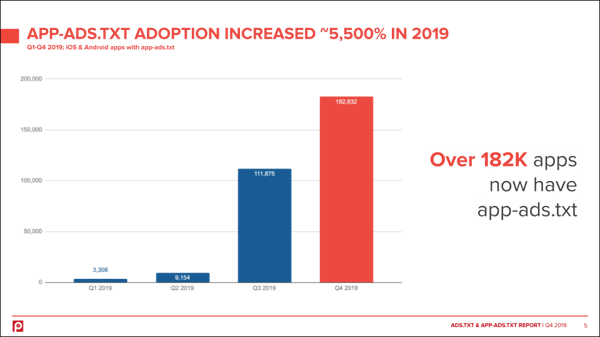
This week's review of ad fraud and quality in the digital advertising space.

According to Pixalate's data, over 182,000 apps had app-ads.txt files at the end of 2019, up from 3,308 at the end of Q1 2019 (when the initiative first launched).
Here are the total number of apps with app-ads.txt files – on iOS and Android combined — as of the last day of each quarter:

Pixalate has been named a winner in Juniper Research's 2020 Future Digital Awards. Pixalate has earned the Gold award for Best Anti-Fraud Solution in Advertising. Read more in Yahoo.

"Coronavirus is shining a light on a long-running problem with overzealous block lists," wrote Digiday in a piece examining the impact on digital advertising. "[E]ntire news-site homepages are also inadvertently being blocked" by adding COVID-19-related terms to keyword blocklists.

In this eMarketer podcast, "senior analyst Jasmine Enberg, forecasting analyst Eric Haggstrom and principal analyst Nicole Perrin discuss how COVID-19 could affect ad spending."

"As new digital channels continue to emerge, such as over-the-top (OTT) and mobile in-app, along with higher demand and lower supply, brands need to become less 'Mad Men' and more 'Math Men,'" reads an AdAge op-ed. "They need to lean into analytics and data science insights for attribution support and return-on-investment insights ... [including] a laser focus on reducing ad fraud."
*By entering your email address and clicking Subscribe, you are agreeing to our Terms of Use and Privacy Policy.
These Stories on Weekly Recaps
*By entering your email address and clicking Subscribe, you are agreeing to our Terms of Use and Privacy Policy.

Disclaimer: The content of this page reflects Pixalate’s opinions with respect to the factors that Pixalate believes can be useful to the digital media industry. Any proprietary data shared is grounded in Pixalate’s proprietary technology and analytics, which Pixalate is continuously evaluating and updating. Any references to outside sources should not be construed as endorsements. Pixalate’s opinions are just that - opinion, not facts or guarantees.
Per the MRC, “'Fraud' is not intended to represent fraud as defined in various laws, statutes and ordinances or as conventionally used in U.S. Court or other legal proceedings, but rather a custom definition strictly for advertising measurement purposes. Also per the MRC, “‘Invalid Traffic’ is defined generally as traffic that does not meet certain ad serving quality or completeness criteria, or otherwise does not represent legitimate ad traffic that should be included in measurement counts. Among the reasons why ad traffic may be deemed invalid is it is a result of non-human traffic (spiders, bots, etc.), or activity designed to produce fraudulent traffic.”

